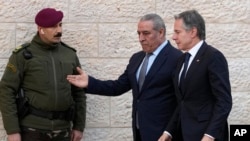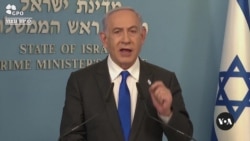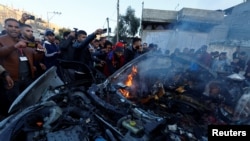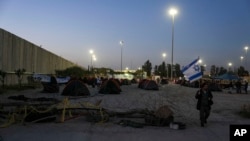U.S. Secretary of State Antony Blinken said Wednesday that Hamas militant leaders' proposal for a cease-fire in exchange for the release of Israeli hostages contained "clear nonstarters," but leaves room for ongoing negotiations.
Israeli Prime Minister Benjamin Netanyahu, however, rejected the plan offered by Hamas to end the war in Gaza, instead vowing to push forward with his nation’s attack on the militants until it achieves "absolute victory."
The Israeli leader ruled out an offer by Hamas for an end to four months of fighting accompanied by a staged, 4½-month release of about 100 hostages held by Hamas in exchange for hundreds of Palestinians imprisoned by Israel.
But the Hamas offer also called for the militants to retain governing control of the narrow territory along the Mediterranean Sea and the right to rebuild its military capability.
"We are on the way to an absolute victory. There is no other solution," Netanyahu said at a news conference after meeting with Blinken. He said the Jewish state’s war effort would take months, not years.
At a separate press conference after meeting with Netanyahu later on Wednesday, Blinken told reporters, "What I can tell you about these discussions is that while there are some clear nonstarters in Hamas' response, we do think it creates space for agreement to be reached. And we will work at that relentlessly until we get there."
Blinken did not specify the "nonstarters" in the Hamas response. However, when asked if the U.S. would accept a role for Hamas in governing Gaza in the aftermath of the conflict, he stated that the short answer is no.
The top U.S. diplomat is on his fifth round of talks with Mideast leaders in a so-far fruitless effort to end the warfare that erupted with the October 7 attack on Israel that killed 1,200 people. Hamas health officials in Gaza say Israel’s counter-offensive has killed more than 27,500 and displaced about 2 million Gazans from their homes.
Blinken held talks Wednesday with Palestinian Authority President Mahmoud Abbas in Ramallah and with senior Israeli national security leaders, including Netanyahu and Israeli Defense Minister Yoav Gallant.
Blinken reiterated U.S. support for the establishment of a Palestinian state as the best way to ensure lasting peace and security for Israelis and Palestinians alike, and greater integration for the region. According to the State Department, Blinken also emphasized the urgent need to de-escalate tensions in the West Bank and prevent the conflict from expanding.
Netanyahu has rejected any arrangement that would leave Hamas in full or partial control of Gaza. He also said Israel is the "only power" capable of guaranteeing security in the long term. The U.S. has called for a revitalized Palestinian Authority to govern Gaza and the Israeli-occupied West Bank, which Netanyahu has also rejected.
While some Netanyahu critics inside Israel and abroad have criticized him for having no definitive plan to govern Gaza when the war ends, he said bluntly, "The day after is the day after Hamas. All of Hamas."
Martin Griffiths, United Nations undersecretary-general for humanitarian affairs and emergency relief coordinator, said that more than half of Gaza's population is currently crammed in Rafah, a town originally home to 250,000 people situated right at Egypt's border.
"Their living conditions are abysmal — they lack the basic necessities to survive, stalked by hunger, disease and death," he said.
A senior Hamas official announced that a Hamas delegation would travel to Cairo on Thursday to continue the negotiation and pursue cease-fire talks with Egyptian and Qatari officials.
In its proposal, Hamas called for three 45-day phases, first releasing all remaining women and children, as well as older and sick men, in exchange for an unspecified number of Palestinian prisoners held by Israel.
The Hamas plan calls for Israel to withdraw from populated areas and end its aerial bombardment while also allowing far more humanitarian aid to enter Gaza and permitting Palestinians to return to their homes, including in devastated northern Gaza.
The second phase, to be negotiated during the first, would include the release of all remaining hostages, mostly soldiers, in exchange for all Palestinian detainees over the age of 50, including senior militants, to be freed by Israel.
Israel would release an additional 1,500 prisoners, 500 of whom would be specified by Hamas, and complete its withdrawal from Gaza.
In the third phase, the sides would exchange the remains of hostages and prisoners. Israel says it believes more than two dozen of the remaining 130 or so hostages in Gaza have already died or been killed.
A previous temporary cease-fire in late November lasted for a week and brought the release of more than 100 hostages from Gaza and 240 Palestinian prisoners held by Israel. The Israeli military said Tuesday that 31 of the remaining hostages are dead.
VOA United Nations correspondent Margaret Besheer and White House bureau chief Patsy Widakuswara, and Ken Bredemeier contributed to this report. Some information came from Agence France-Presse and Reuters.








